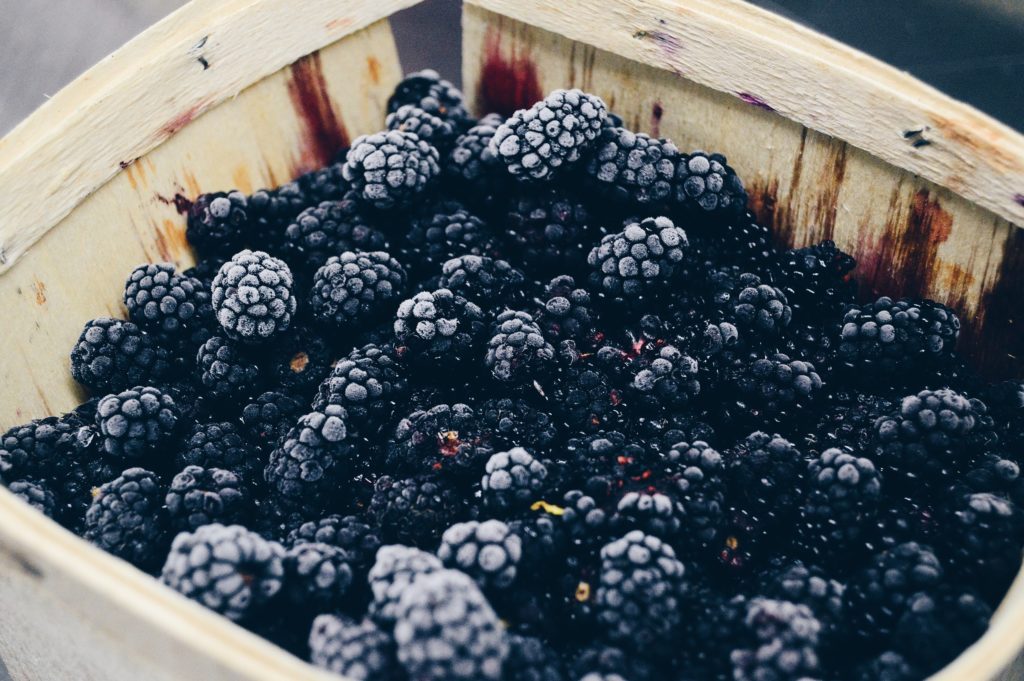
Berries are among the most nutritious and delicious fruits available, and blackberries provide an unmistakable soft, succulent, and juicy freshness that delights the taste buds while simultaneously providing a little extra hydration.
Can Dogs Eat Blackberries?

Photo by Nick Sarro on Unsplash
Dogs will naturally chomp at any tasty treat that comes their way, but it should be noted that not all fruits and berries are suitable for dogs. Cherries, holly berries, and juniper berries are just three types that you must stay wary of. As for blackberries, though, the great news is that it is perfectly fine to let your dog eat away.
Blackberries can be consumed in several forms. If you are eating them as a snack yourself, handing your pup a small handful is fine. Alternatively, you can freeze blackberries and put them in a dog feeding toy with low-fat yogurt for a dog-friendly ice cream treat. It is also possible to buy dog treats, including frozen yogurt that incorporates blackberries.
Wholesome dog cookies that are packed with the blackberry punch can be created by mixing two cups of berries to a small banana, some oat flour, almond milk, oats, and wheat flour. The dough can be baked for 20 minutes at 400 degrees to produce a delicious treat.
Most dogs love the sweet tastes, soft textures, and cold temperatures of the blackberries, not least on a warm day. While blackberries aren’t an essential addition to the dog’s diet, and you certainly need to worry about making them a daily (or even weekly) treat. Nonetheless, the fact that they are a healthy treat that your dog will love means they should not be ignored.
Is there Any Nutritional Value in blackberries?
If your dog responds positively to the taste of blackberries, you will naturally want to let them tuck in for the sake of their happiness. Nonetheless, as a responsible pet owner, it’s important to analyze the health elements too.
Like humans, dogs can enjoy a host of rewarding features by adding blackberries to their diets. They are packed with various antioxidants, including anthocyanins. These fight radical agents, which means they have anti-inflammatory properties and anti-viral effects. They additionally boost brain function and can reduce the threat of heart disease and cancer.
Blackberries are also loaded with vitamins A, B, C, E, and K. This supports your dog in many ways including a stronger immune system, hormone synthesizing, increased energy levels, reduced inflammation, and increased metabolic rates. It also encourages healthier growth in puppies.
The high levels of fiber can support a healthy digestive system, easing symptoms of diarrhea and constipation. Omega 3 acids, which are found in blackberries too, can support a shiny coat, healthy skin, and strong teeth. The fact that they offer all of these nutritional rewards with low sugar content is even better.
While blackberries won’t provide all of the nutritional content to support the health benefits mentioned above, they will play a significant role. When added to the taste benefits, it’s no wonder so many dog owners are turning to this tasty treat.
What are the alternatives to blackberries for dogs?

Photo by Alex Block on Unsplash
Blackberries aren’t the only berries that can be safely consumed by dogs. Most veterinary experts and pet nutritionists agree that blackberries form a part of a holy trinity that is completed by strawberries and blueberries.
Strawberries are high in fiber and Vitamin C while they are also packed with antioxidants to promote better health. They are best consumed as a frozen treat, either as a doggy ice lolly or with yogurt. The high sugar levels mean you must take care regarding quantities, but they do contain a teeth-whitening enzyme, which is an attractive factor.
Blueberries are a known superfood for humans, and can form a positive part of your dog’s diet too. The antioxidants and fiber are supported by phytochemicals to provide a nutritious and delicious treat. Due to their low calories, they can be mixed with naughtier treats for a truly tasty snack.
Cranberries and raspberries can be consumed too, although you are best suited to the three berries mentioned above – with a focus on blackberries. Other berries to avoid include mistletoe berries, gooseberries, salmonberries, baneberries, pokeberries, and dogwood berries.
Considerations when giving your dog blackberries
Like any type of food, it’s important for your dog to enjoy blackberries as part of a balanced diet. Perhaps the most important word to remember is ‘moderation’. Dogs of different breeds and sizes will be able to safely consume different quantities. However, the rule of thumb is that blackberries should never account for more than 10% of a dog’s daily calorie intake.
Eating too many blackberries can cause a number of issues. Not only do they create an imbalance by providing too much of the good stuff, but they’ll also prevent your pup from gaining other nutritional benefits from a varied diet. Moreover, it should be noted that blackberries include a tiny amount of xylitol. This is toxic to dogs. Your dog would never get sick from eating blackberries in moderation, but eating hundreds on a frequent basis can cause problems.
Even if it doesn’t get to that stage, dogs can suffer from diarrhea, vomiting, and gastrointestinal upset as a result of eating too many blackberries. Besides, eating too many will turn them from a tasty treat into a tedious snack. Dogs require variety just like we do, especially in regards to treats. Do not forget it.
Summary
Hopefully this article no longer leaves you asking the question, can dogs eat blackberries?
Blackberries are a suitable treat for your dog and can be consumed in a variety of ways. However, they must form a part of a balanced and nutritious diet.
When your pup enjoys blackberries as a tasty treat or way to cool down, alongside the staples of a good diet, a healthy and happier future awaits.



















